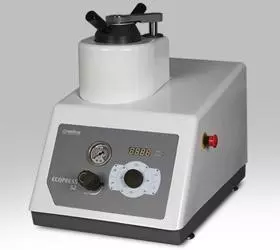Mounting Press For Specimen Mounting
Specimens are mounted for the following reasons:
- Convenient means to hold specimens that are too small or awkwardly shaped.
- Edge retention or the protection of surface layers and films.
- Provides proper specimen orientation.
- Providing support for a mechanical test such as hardness testing.
- Marking and labelling of specimens.
Mounting Methods
The two main techniques used are hot compression mounting and cold mounting. Depending on the type of specimen and the number of samples required, both methods have their advantages and disadvantages. Cold mounting is used for specimens that may be damaged by heat or pressure. Hot mounting is normally quicker and more economical. To reduce the problem of edge rounding, the shrinkage gap between resin and specimen should be kept to a minimum, and this applies to both techniques.
Hot Compression Mounting
Hot mounting of specimens requires the resin to be heated and cooled under pressure. They are easy to produce, taking only several minutes. The resins are cheaper than the cold setting resins. Two types of resin are available - Thermosetting and Thermoplastic. Thermosetting resins cure at elevated temperatures, while Thermoplastic resins soften at elevated temperatures and solidify again on cooling.
| Phenolic (Bakelite) | Acrylics | Epoxy (glass filled) | Diallyl Phthalates (Edge Mount) | |
|---|---|---|---|---|
| Curing time | 90-120 sec | 2-4 mins | 90-120 sec | 90-120 secs |
| Shrinkage | Good | Good | Excellent | Excellent |
| Cost | Low | Medium | Medium | Medium |
| Edge retention | Fair | Good | Excellent | Excellent |
| Hardness | Low | Good | High | High |
| Cycle times | Excellent | Moderate | Good | Good |
| Ease of use | Excellent | Moderate | Good | Good |
Kemet Conductive Phenolic (Bakelite) Resins
These are phenolic resins that have had carbon filler added to them to become conductive. They are used to mount specimens for Scanning Electron Microscope work and they provide good edge retention.
Kemet Diallyl Phthalates (Edgemount)
Diallyl phthalate resin contain glass fibres which provide excellent edge retention , high hardness, low shrinkage and chemical resistance. It is used for edge protection and to minimise edge rounding. It is ideal for examining specimens with corrosion, erosion and plated surfaces.
Kemet Cold Mounting Systems
This method is used if the specimens are sensitive to pressure and heat such as printed circuit boards, plastics, composites and seed grains. Cold mounting resins tend to be more expensive than hot mounting resins. The specimen is placed in a mould and the resin poured on top. The resin is usually a mixture of two components: a resin and hardener. Some use three components. These must be used in the correct amounts, carefully measured either by weight or volume and thoroughly mixed before use.
Three main resins are available - Epoxy, Acrylic and Polyester - with differing properties, in terms of curing times, adhesion, chemical resistance and shrinkage. In very general terms, Epoxy resins have longer curing times with better edge retention, while Acrylics have faster curing times with some shrinkage and are generally more expensive.
Kemet Epoxy Resins
These have relatively long curing times, 18-20 hours or 1-2 hours for the shortest setting resin. Quicker curing resins have greater shrinkage, where as slower curing resins have lower shrinkage. Generally Epoxies have the lowest shrinkage, with good adhesion to the specimen, and very good edge retention. They are not affected by moderate heat or chemicals.
Kemet Acrylic Resins
Unlike Epoxy resins, generally these have very fast curing times of around 5-10 minutes. They are very easy to use with low shrinkage, although the quickest curing time resins do have some shrinkage.
Kemet Polyesters Resins
Like Acrylics these have relatively short curing times and are more economical for routine mounting, for a large number of specimens. Both Acrylic and Polyester resins are formed by the addition of a catalyst to the self-polymerising components.


